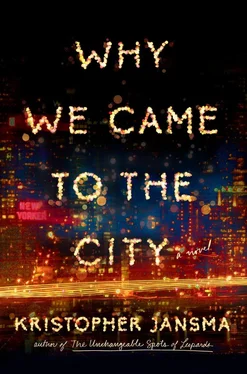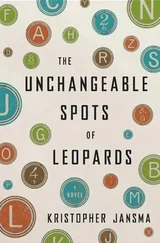Inside her apartment, Sung-Lee was tearing William’s coat off before the door had shut behind them. He liked the way her hands felt against his sore jaw. The way her teeth nipped at his ear. His tongue throbbed a little where she’d bitten it, but this pain, along with the familiar ache above his eye, was lost in the whole ache of his body now. It was dark in the room, and he couldn’t see her very well, only shadows and the warm feel of her skin against his. She pulled her dress up and off, and beneath there was only cinnamon flesh and pink underwear, no bra, the silver sharks’ teeth falling down between her breasts. He buried his head there and filled his lungs. Poppies and Earl Grey. Her hands were tussling with his belt buckle, fingers hooking through the loops, steering him into the room.
Her black hair whipped around her head like something self-possessed, and she demanded, “On the couch.” William looked longingly over toward the other side of the room, at her bed, but there was no reaching it. She almost hurled him onto the couch. Increasingly it was all William could do to simply hang on and do as he was being told — loudly and repeatedly — not sparing on the fucks and the shits and other things. She was purposefully screaming. There was no way he was that good. Not that it wasn’t kind of incredible, though. Even if it felt a bit like he was being used. Even if it was a relief on several levels when it was over. “That was nice,” she said, though little about it had been anything like nice at all.
He woke up a few hours later to the sound of her in the bathroom, and watched through slit eyelids as she came out, fully dressed, and quietly left the room. Six a.m. flight to Istanbul. Business class, nonstop. William walked over to the bed, finally, and pressed his face into the cool pillows. Just as he began to slip back to sleep, he felt a warm hand on his back, and the tip of a nose on his neck. Had she come back? Changed her mind or gotten a later flight?
How was that? came a whisper in his ear. What was that like?
William started up and began to roll over, but just as before, he felt a hand press against his cheek as if to stop him. He felt a flood of guilt, of stomach sick. As if she’d seen the whole thing.
Oh please , she said. Don’t be ridiculous. It’s just sex. And if I thought you’d fall in love with Sung-Lee and forget all about me, I’d say go for it.
William felt his face go hot. He wouldn’t cry in front of her, whether or not she was really there.
She was quiet a moment, and he thought maybe she’d gone. I have to say, I really miss sex .
Ghosts can’t have sex?
No bodies, no nerve endings.
No fair.
You don’t know the half of it.
William felt her hand lift from his back, and he reached around to grab it but found only air and his own warm skin. I’ll find you , he promised.
As he fell asleep, he thought he heard her saying, I’m not lost .
9
Twelve Spruce was a prewar building made of clean white brick. William located the dusty buzzer near the door and tentatively pressed 4R. He knew it was crazy, but he wanted to try. If no one was home, then fine. But to his surprise, the door shook and unlocked. Across a dark lobby, he climbed into a creaking old elevator that took him slowly to the fourth floor. There he soon found 4R, with a mat out front that said WELCOME.
William knocked at the door and waited. A few moments later someone answered. An old Hispanic woman with wide wrinkled circles around her eyes. For a brief moment, though he knew she was long dead, William imagined it was Grandma Fiona. Behind her the sound of rapid gunfire and shouting in Arabic came from the television, followed by a trumpeting of transition music and the opinions of an unseen news anchor.
He took off his hat. “Hi. I’m sorry. You don’t know me, but a friend of mine used to live here in your apartment. And I was wondering. Could I come in for just a minute?”
There was, he knew, no earthly reason this woman should allow him, a total stranger in a slightly disturbing French punk rock T-shirt, to enter her home, but to his surprise she moved away from the door without a word.
“My name is William. Um… Mi nombre es William?”
She nodded and walked back over to the big white couch in front of her TV. The floor was covered in scattered trucks and balls and other children’s toys. There were religious paintings on the wall, a Madonna and Child and a few Christs on crosses. Everything seemed to have been recently remodeled. The floorboards were new and fitted together. The walls were white and bumpy, in the way of all New York apartment walls, painted over with each new tenant. If only he could peel it back and see underneath. Would there be smudges and tea stains and fingerprints and stray flecks of oil paint that had once been Irene’s? William moved lightly into the apartment, wondering which of the rooms had been her bedroom. He passed a sideboard table that was being used as an altar. There were photographs of children and grandchildren to be prayed for, and in front of those an arrangement of candles and little statues. A bowl for holy water, and a smaller one with something grainy inside like salt. There was a very nice set of rosary beads carved from a red wood, just next to a little incense burner covered in ash marks.
William stood there and thought about his mother, who would be back at home by now, putting away the tools of her ancient trade: apples and rice cakes and money and tiny paper figures. Iron chains and small boats that she’d waved in the air. Drums and pieces of paper drawn now with letters and symbols. Science and medicine were good things, his mother had told him, growing up. To heal diseases, to mend bones, to tend to the sick, the elderly, and the newly born. To do research on AIDS, as Charles did, and to peddle pills and vaccines like Sung-Lee — these were noble things. And lucrative, not to forget that.
But a mudang treated something else. Something that couldn’t be reached with chemicals or seen on X-rays. The thing that causes illness, the thing that comes before viruses and bacteria, even DNA. Uhwan. What she called “misfortune” and others might think of as simple “bad luck,” though it was far worse than that when uhwan began to creep into your life. Just a few things would go wrong at first, but well within the realm of expectations. A setback here, a letdown there, but you keep up, mostly. Bad things happen, but don’t they happen to everyone sometimes? Only like in an undertow at the beach, you are being pulled gradually in the wrong direction. You correct, but you overcorrect. You flail, but this makes it worse. Things fall apart, and you hurriedly glue the pieces back together and cannot ignore the resulting cracks. There isn’t time to do more because other, larger things are going wrong already. Medicine cannot cure the problem. Psychology cannot resolve it. One day you wake up to discover that where once there was one thing wrong, there are now hundreds. Far more is wrong than right. Because misfortune is a plague that begets plagues. What starts as a tiny imbalance creates a ripple effect that can take down empires.
What string of ever-worsening misfortunes preceded Chongso’s accident? What had made Mrs. Kim decide to punish him that morning? What had led him to dare to sneak out on his own to buy the comic book? What had the driver been doing instead of watching the road? No disaster is a singular incident. It is the tsunami that follows the swelling tide. It is the nuclear meltdown that begins when a dozen fail-safes have failed. Before the chemo, before the cancer, before the cell mutation, there is the misfortune. Uhwan .
Читать дальше












